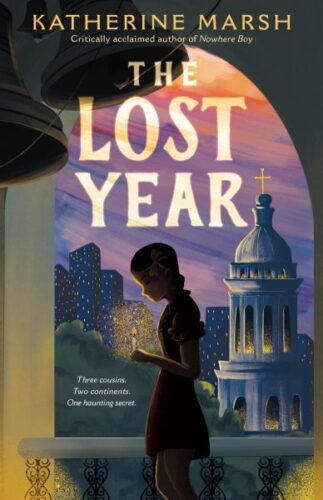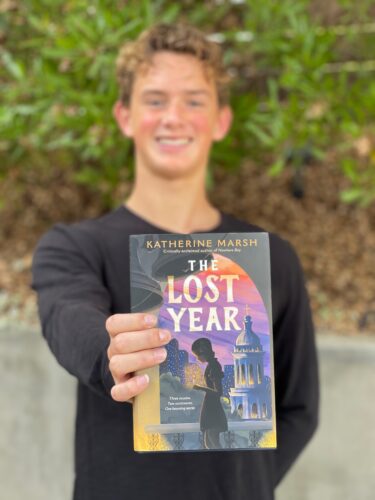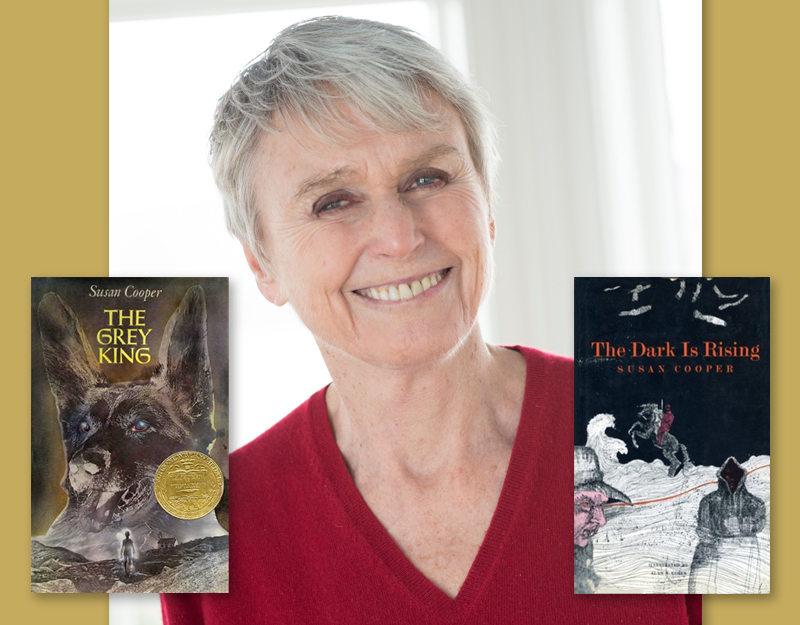Heavy Medal Mock Newbery Finalist: THE LOST YEAR by Katherine Marsh
Introduction by Heavy Medal Award Committee Member Quade Kelley:

The Lost Year is a historical fiction coming-of-age story told through three entwining timelines.
The story occurs in the early 2020 COVID-19 pandemic in the United States and the 1930s Holodomor in Soviet-occupied Ukraine. Inspired by the author’s family history, the story connects a shared experience of stress, isolation, and survival through the perspectives of a 13-year-old American boy, Matthew, and his Ukrainian Grandmother.
The themes of resilience, discovery, family, and empathy begin when Matthew is homebound and separated from family due to the pandemic. After discovering a family photo belonging to his Grandmother, he explores the parallels of the past with her through the parallel narratives of Mila, a wealthy teen in Soviet Ukraine, and Helen, the daughter of a displaced Ukrainian immigrant, re-building a life in Brooklyn, New York.
ADVERTISEMENT
ADVERTISEMENT
The timing of this book is perfect. Current tragedies in Ukraine and Gaza are deeply rooted in historical events that are challenging for kids and teens to understand. The Lost Year is a timely and exciting novel that gives kids some backstory into the current global conflict. Marsh has written a book that provides a relatable lens, drawing on our experience as kids during the worldwide pandemic of COVID-19 and connecting the emotions of isolation and fear many people experienced. Recognizing history and connecting it to current events through incredible plot development is the greatest strength of this story.
Criteria #3: (Development of a plot) 11/10
Marsh does a superb job of weaving a story in the book and just bringing the reader along on the roller coaster ride of a novel. The unexpected combination of a pandemic story and the tragic history of the Ukrainian famine proves to be an incredibly clever match-up. Balancing the story arcs of 3 intertwining characters, Marsh built a captivating plot that peaks with a breathtaking narrative twist. True character identities are revealed in a shocking plot peak, causing me to fall out of my reading chair and mirror the “Wait, what?!” (292) moment. Flipping back and re-reading many sections of the story, I conceptualized how she set the reader up, considered our own bias, and revealed that disguised truth is often something we must discover through exploring multiple perspectives. I forgive Marsh for deceiving readers through 80% of the book because it is a masterpiece of storytelling. The ending and overall plot reminded me of my favorite two Newberry books When You Reach Me and The Westing Game, where the author foretells the ending by dropping little “Easter Eggs” throughout the book, weaving it all together at the end.
Criteria #4: (Delineation of characters ) 10/10
The Lost Year contains three narratives, all distinct and interwoven. Initially, they all felt disjointed, which becomes part of the narrative that ties them together. For example, Matthew’s perspective (of Mila)
“felt like a story when GG had directed me through them and I’d written about them in my notebook. But I couldn’t figure out where to begin or how to take all those pieces and string them together. I couldn’t decide whether I should tell it from all the three cousins’ points of view or just GG’s and whether I should include myself. I tried it a bunch of different ways, but none of them felt right.”
321
I enjoy how Marsh provides character development through the parallel perspectives of Mila and Helen. The language was emotional, tracing their growth as they made hard life decisions while reacting to world events. Marsh’s multi-perspectives are tied up well and reminded me of my favorite Newbery title, The Westing Game.

Criteria #5: (Delineation of a setting) 10/10
Marsh does a marvelous job of exploring these multiple settings and bringing them to life for the reader. I particularly enjoyed Matthew’s setting, reflecting on the recent COVID-19 conditions in America. The Ukrainian setting also connects to the modern Ukrainian war and helps provide a history of global conflicts today. Could a Newberry Medal mark this time in history for future readers? Yes. It is a book I will hand to kids who are curious about pandemic perspectives in the future. (I was a history-studying 5th grader in 2019-20 too.)
This book is relevant, well-written, creatively distinct, and powerful as a story and tool that makes middle-grade readers history detectives who can masterfully connect personal experience to the weight of current events. I fully expect a 2024 Newbery award for The Lost Year.
Heavy Medal Award Committee members and others are now invited to discuss this book further in the Comments section below. Let the Mock Newbery discussion begin!
Filed under: Book Discussion, Heavy Medal Mock
About Emily Mroczek-Bayci
Emily Mroczek (Bayci) is a freelance children’s librarian in the Chicago suburbs. She served on the 2019 Newbery committee. You can reach her at emilyrmroczek@gmail.com.
ADVERTISEMENT
ADVERTISEMENT
SLJ Blog Network
Name That LEGO Book Cover! (#53)
Review of the Day: Being Home by Traci Sorell, ill. Michaela Goade
Exclusive: Vol. 2 of The Weirn Books Is Coming in October | News
Fighting Public School Book Bans with the Civil Rights Act
North Texas Teen Book Festival 2024 Recap
ADVERTISEMENT








“People’s stories matter.” (96)
While young readers today likely know about WWII and the Holocaust, it’s unlikely that they have heard of the Holodomor, and Marsh connects that era to ours through the theme of (dis)information and the importance of people’s stories. Historical fiction isn’t as wildly popular a genre for youth as it once was, but Marsh’s work here is impeccable; I think she nails every one of the six Newbery criteria.
The three storylines, and three characters, balance beautifully, which is tough to do: often, the present-day storyline is weakest, serving as a framing device for the historical stories, but that is not the case here. (I agree with Betsy Bird: “A kid stuck with his great-grandmother for weeks on end is going to be more inclined to hear her story than one able to leave the house.”) And in this case, there are two stories set in the past, in the same year (1933), in different locations, but Matthew’s personal connection to his Ukrainian grandmother’s story is strong, and he and Brooklynite Helen are asking a lot of the same questions about (dis)information and how to change people’s minds.
This theme is strong throughout all three stories: Matthew asks his journalist dad, “”So how do you change people’s minds?” (148) and Mila’s music teacher Anna answers, “A kind heart makes change possible” (180).
Quade, I too was impressed with the “breathtaking narrative twist,” although I wouldn’t call what Marsh does deception; it’s Matthew’s grandmother’s secret, and the reveal is incredibly effective. For so many reasons, this is a memorable book.
This book ended up in the middle of the pack for me in terms of my favorites, but I had the same thought as Quade, this feels like a strong Newbery contender for all the reasons he gave. The perfect blend of elucidating a historical time period (and a tragedy/human rights crime at that) with the hyper-modern day (I was pleasantly surprised to see The Legend of Zelda as an opening quote).
I love a book with a twist! I wondered why we didn’t get Nadiya’s perpsective throughout, so that twist worked well for me as a reader. I think structurally there were some quibbles I had—with how he was getting this story in that manner,etc–but ultimately, I found this a very moving and timely piece and think, as everyone said, it’s a Newbery Contender for sure.
This was my kiddo’s favorite book, and it isn’t at all in her wheelhouse as she doesn’t generally read historical fiction. I thought that the author made the modern and the historical kids believable and distinct and she weaved the individual threads of the story together in a compulsively readable fashion.
I also had a few quibbles about the way the story is presented. Toward the middle of the book, the transitions between the chapters become seamless and it becomes evident that GG is narrating Mila and Helen’s chapters to Matthew, but it kind of doesn’t make sense given that Mila’s story starts right away at a time when GG is still only speaking two words at most to Matthew. I suppose, however, that it wouldn’t make sense to have Mila and Helen’s stories start halfway through, and that is really my only issue with this book. I think having Matthew spend a lot of time inside because of the COVID-19 pandemic is a perfect way to set up all the time that he will spend with GG. Not only does it work as a storytelling device, it is relatable to readers, like when he calls his dad and this happens: “He sounded out of breath. Back in normal times I would have just assumed he’d run for his phone, but all I could think was what if he was coming down with Covid?” (100). This important story about a tragic historical event is so perfectly framed for young readers that I, too, would not be surprised if it took the Newbery – especially with that gut punch of a reveal!
Quade, I absolutely agreed with your entire review. This was, hands down, one of my top books of 2023. I LOVED it. In fact, I was able to share this book with one of my patrons (who hates historical fiction….but was using Les Miserables as her barometer….) when I booktalked the “mystery and deception.” As I described the characters, I found my patron getting more and more excited to read this book. I’ll be seeing her this next week and I’m dying to know her thoughts on The Lost Year.
It was one I bought myself for Christmas. And I often don’t buy middle grade fiction to own. There was something about the storytelling and the characters that was so impactful for me. I also think that it was an excellent, realistic portrayal of what some families went through with Covid19 (without getting politically, being solely about the virus, more the relational side of things). I cannot sing the praises of this book enough!
What a Youth Services librarian chooses to buy a book for their own library, that says allot!
All year I have gone back to this book. When the conflict in Gaza escalated and I thought about all of the kids. Is this their Lost Year too? Addressing global “conflict trends” by reflecting on the COVID-19 pandemic experience puts a lens on this moment of history is really… what is the word, relevant? brilliant? distinguished?
I would really like to hear what other HMAC committee members think of this book.
To win, a title must have a majority of members (min 8) select it as a top choice and have an 8 point lead over all the other books. While we each have our top choices, this book seems to have a more universal appeal within the committee. What do youthink?
I really enjoyed THE LOST YEAR and I learned a lot about a part of history that was not a part of my prior knowledge. Using the pandemic and its effects on family relationships, something that our children have all experienced and lived through, as a lens with which to build historical connections was a fantastic literary choice. I believe that reading about the pandemic in fiction will help our children and young adults process the events of the last few years and THE LOST YEAR does a great job of including a child’s perspective and experience of the pandemic while avoiding the more adult concerns and experiences.
The characters were interesting and dynamic, never one dimensional, and the plot kept the reader wondering about connections and guessing what would come next throughout. The inclusion of an arc of redemption, both being forgiven by others and by your own self, is complex but so well handled and expressed. I really enjoyed the twist at the end, and I thought that it was explained in a loving and forgiving way, rather than making grandma seem dishonest or untrustworthy.
Quade, I also really appreciated your thorough review. You made so many great points and helped me remember what I loved about this book.
I wish this book had been written in the 3rd person. I didn’t feel the voices of three very different narrators were differentiated enough or even credible as 1st person.
I understand what you mean Leonard. I listened on audio which helped me differentiate the characters but it definitely shifted more than I like which i think wasn’t the best presentation. However as mentioned in comments on SAMIR, I think the not credible narrators is really what makes the title realistic and strong. I mean Gigi is reliving these memories so many years later and seeing her reactions to those– it’s all very raw
I don’t like feeling tricked as a reader. Writing can include effective twists or cunning “devices.” A few years ago, a local Mock group was talking about Rhodes’s GHOST BOYS, and we agreed it felt a bit gimmicky. Same with THE LOST YEAR. I enjoyed it, but there were times when it felt clever for clever’s sake. If this makes the final five, I will need to re-read it to confirm this conclusion.